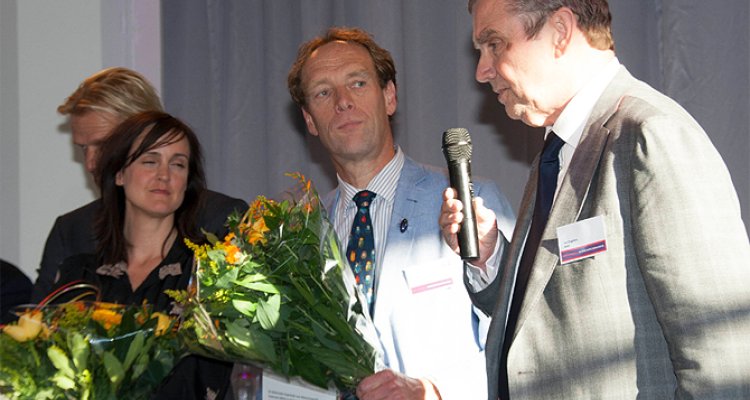
Press release
Eureka Prize for Wageningen 'Insect Ambassador' Marcel Dicke
The Eureka Prize for Science Communication 2013 has been awarded to Professor Marcel Dicke of Wageningen University. He receives this lifetime achievement award in recognition of his passionate involvement in creative public activities that focus attention on the versatility, unique characteristics and possibilities of insects. Dicke received the Eureka Prize on 1 October during the opening of the Netherlands’ national Weekend of Science. The team of nature radio and TV programme Vroege Vogels won the Eureka Prize in the media category.
The Eureka presentation ceremony was held in Rotterdam, where the prizes were awarded by chairman of the Netherlands Organisation for Scientific Research (NWO) Prof. Jos Engelen and president of the Royal Netherlands Academy of Arts and Sciences (KNAW) Prof. Hans Clevers. The Eureka Prize is awarded to scientists and journalists who have done an outstanding job of communicating scientific research to the general public.
The Wageningen Professor of Entomology Marcel Dicke (1957) has combined excellent research with a passion for making science accessible to a wide audience. In 2007 he was awarded the Spinoza Prize (also known as the Dutch Nobel Prize) for his scientific work. He also led the team from Wageningen University that won the first Academic Year Prize in 2006. His team organised the Wageningen – City of Insects science festival, which drew more than 20,000 visitors and received worldwide attention in the media.
Marcel Dicke is also the author of the popular science book Blij met een dooie mug in which he used concise and entertaining stories to describe the link between insects and our daily lives. Together with his team, he produced the Insectenkwartet and the book Muggenzifters en mierenneukers. Creating a breakthrough in the kitchen, he wrote The Insect Cookbook for hobby cooks and others, together with Professor Arnold van Huis and cooking teacher Henk van Gurp. The richly illustrated book about insects as a new, sustainable source of animal protein will be published in February 2014 by Columbia University Press.
Whenever Dicke is asked why we should eat insects, he invariably answers: ‘Because they are delicious!’ before going on to explain all the underlying advantages. In 2009, he enthusiastically presented his arguments for putting insects on our menu at TEDx Amsterdam and in 2010 at TED Global in Oxford. His TED presentations have been viewed more than 550,000 times.
Insect Ambassador
Dicke’s research has shown that plants are not helpless victims of herbivorous insects; in response to insects feeding on them, plants produce odours that attract the enemies of these herbivores, a phenomenon that Dicke summarised as ‘plants that cry out for help.’ This phenomenon has now been demonstrated for more than 50 plant species in 21 plant families worldwide. It turns out to be a general characteristic of plants.
His approach to making science attractive for a general audience is characterised by his use of evocative metaphors. His many activities to emphasise the importance of insects for the world (‘without insects, no life on earth’) have resulted in him being given the nickname the Insect Ambassador.
As head of the Laboratory of Entomology he has put together a well-balanced, enthusiastic team of insect experts (entomologists). Among other topics, the team conducts research into current medical themes in which insects play a role, such as malaria mosquitoes, midges and ticks that can transmit Lyme’s disease. Recent evaluations by international review boards have given the Laboratory of Entomology excellent scores on all criteria (quality, productivity, relevancy and viability).
Prof. Dicke is currently a visiting professor by invitation at Cornell University in Ithaca, New York.